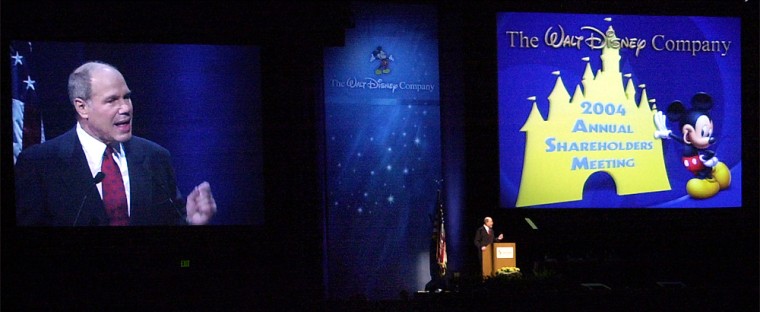Frustrated Disney shareholders spoke with a loud voice, and the company responded by stripping CEO Michael Eisner of his chairman’s title — a move unlikely to quell the grumbles among many of the 43 percent who voted to withhold their support for Eisner.
Disney’s board met late Wednesday and voted unanimously to sever the roles of chairman and chief executive, naming director George Mitchell as nonexecutive chairman. Eisner is keeping his job as CEO, and the board reiterated its approval for his leadership and the company’s strategy.
Yet the change in management structure came only hours after a stunning number of Disney shareholders — nearly half — did not support Eisner’s re-election to the board.
Major institutional shareholders have been critical of Eisner’s autocratic management style and what they say is a subpar record of creating value for Disney’s shareholders over the past several years. They also want Eisner to be more accountable to the board of directors and a clear succession strategy put in place.
Although the action curbs Eisner’s control over Disney and addresses the concerns of corporate governance groups who had called for the change, it won’t satisfy the company’s most vocal critics, ex-board members Stanley Gold and Roy E. Disney. The men have vowed to continue their fight to oust Eisner.
In an interview with ABC’s “Nightline” program Wednesday, Eisner, 61, acknowledged the vote against him: “I do not belittle a large withhold vote.” He also portrayed the jobs split as the result of wider reforms in corporate America.
“We should have been considering, and getting our company into contemporary governance and we did it today. We heard our shareholders who seemed to be interested in that, so we went ahead and did it,” he said.
“And there are obviously certain people that are not happy with me personally, I guess,” Eisner added.
Mitchell, a former senator from Maine, may also prove to be a controversial choice. Shareholders withheld 24 percent of their votes from his re-election Wednesday — the second highest total after Eisner.
Mitchell has been criticized by Gold and Roy Disney as being too close to Eisner and not independent enough because his law firm had worked for Disney in the past.
Early investor reaction to the changes was positive but muted. Disney’s shares were up 17 cents at $26.82 in morning trading on the New York Stock Exchange.
In its statement, the board said it understood that investors were concerned about more than just the issue of separating the chairman and CEO positions.
“We are aware that some voted for an immediate change in management and in the board,” the statement said. “However, taking all these factors into account, we believe the action we have taken today is in the best long-term interest of the shareholders of the company.”
Institutional Shareholder Services, a proxy advisory firm that had recommended its large investor clients withhold their votes from Eisner, said the Disney board’s change was welcome, but insufficient.
“If the Disney board believes this is the silver bullet to fix all the problems, they are sort of mistaken,” said Cheryl Gustitus, an ISS spokeswoman. “The level of the vote makes it clear that investors have a lot of more on their minds than just the splitting of the position.”
Earlier Wednesday, the nation’s largest public pension fund, which withheld its 9.9 million votes from Eisner, called for his resignation.
“This discontent is too wide and way too deep in the marketplace, and it has led us to believe that Eisner should go and the board should get quickly to work on planning for an orderly transition,” said Sean Harrigan, president of the board of administration of the California Public Employees Retirement System.
Also Wednesday, Disney’s board rejected a renewed overture from cable television giant Comcast Corp., saying it would serve no purpose to reconsider an offer already dismissed as too low.
The board’s action followed a long shareholders meeting marked by cheers and standing ovations for former board members Gold and Roy Disney, who have waged a bitter three-month campaign to oust Eisner.
The two hailed the vote and said it was a clear indication Eisner should go.
Shareholders, following the advice of Roy Disney and Gold, also withheld more than 20 percent of their votes from two other board members: Judith Estrin and John Bryson.
Analysts had said that in the face of the votes, Disney’s board either had to split the chairman and CEO jobs, do nothing, or fire Eisner, who has served as Disney’s chairman and CEO since 1984.
Eisner, who chaired the meeting, showed little emotion, even as Gold and Roy Disney took the stage and called for his firing.
His voice a bit hoarse, Eisner briefly defended himself and his fellow managers, saying he enjoyed an “excellent relationship” with the dissident board members until they disagreed with his handling of the company after the Sept. 11 terrorist attacks.
“Stanley felt we weren’t listening,” Eisner said. “We felt we were listening and not agreeing.”
“I love this company,” Eisner said. “The board loves this company. And we are all passionate about the output of this company.”
Eisner acknowledged that the performance of Disney’s ABC network was “disappointing,” but he also told shareholders that Disney has “the management skills and creative talent to continue its growth path.”
Gold and Disney went slightly over the 15 minutes they were allotted at the meeting to present their case against Eisner, saying it was not sufficient for the company simply to split the roles of chairman and CEO.
“Michael Eisner must leave now,” Gold said. “We see today’s meeting as a first step toward saving the company. ... We are seeking real and meaningful change.”
Eisner defended his management team: “The criticisms you have just heard are fundamentally wrong,” he said to applause. “I believe you have just heard rhetoric from our critics that frankly replaces reason. It’s a disservice to cast members as well as shareholders.”
